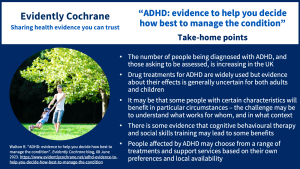In this blog for anyone affected by ADHD, Robert Walton, a GP and Senior Fellow in General Practice at Cochrane UK, examines the latest Cochrane evidenceCochrane Reviews are systematic reviews. In systematic reviews we search for and summarize studies that answer a specific research question (e.g. is paracetamol effective and safe for treating back pain?). The studies are identified, assessed, and summarized by using a systematic and predefined approach. They inform recommendations for healthcare and research. on the best ways of managing the condition and some things you may want to consider when making treatmentSomething done with the aim of improving health or relieving suffering. For example, medicines, surgery, psychological and physical therapies, diet and exercise changes. choices.
Take home points

It’s a diagnosis that sometimes creeps up on you. Parents may have thought for some time that their child was more easily distracted than other children, with a short attention span and always forgetful and losing things.
School reports each year may seem predictable – highlighting mistakes, messy work and poor handwriting. In some children, symptoms are confined to inattentive behaviour but for most with ADHD, there will also be symptoms of impulsiveness, constant fidgeting, interrupting other people’s conversations and talking excessively. Sometimes this behaviour may be labelled by the school as ‘disruptive’. Then the penny drops. A trip to the GP may confirm that a diagnosis of ADHD is likely and a round of specialist assessments then follows – unfortunately at a pretty slow pace in the current NHS. Many private clinics have sprung up to fill the gap, but the quality of advice on diagnosis and treatment may be variable.
For adults, the penny may have taken longer to drop. When it does there may be a feeling of relief when a wide range of symptoms – perhaps previously thought to be due to anxiety or depression – come together under this one banner and finally start to make sense. Or it may be something that is difficult to come to terms with, highlighting the need for extra support. The symptoms are persistent throughout life and will have been there since childhood. Growing older the hyperactivity tends to disappear, but the inattentive cluster of symptoms persists, often interfering with work and social activities.
There is much attention in the media at present about negative aspects of ADHD but there is a positive side too – creativity, spontaneity, energy and resilience may also be part of the picture. It’s important not to forget this!
Nonetheless, people generally want to find ways to help them to manage the condition. So, what is there in the way of treatment to help the increasing number of people diagnosed with ADHD? What might you want to consider when looking at treatment options?
Management choices
Successfully managing symptoms of ADHD generally involves constructing a flexible plan with different components involving social and environmental changes, coupled with psychological and drug therapy if needed. Different components of the plan will have different weights at each stage of a person’s life. Developing a good understanding of different aspects of the condition and working out ways around the challenges that it brings is fundamental to effective symptom management. Many resources are available to help with this by providing information and support.
Solutions to address specific problems are likely to be different for different people at different times, but people may benefit from very simple changes to everyday routines. Examples might be changing your environment to reduce distractions when necessary, or starting to use a diary and to-do list. If specific treatments are needed then there are several options, each of which could be a part of the overall management plan according to personal preference. (You may like to read this blog ‘Making health decisions: things that can help’).
Drug treatment for ADHD
Perhaps the first thought for patients, parents and doctors is “What medication can I use that might help?”.
Methylphenidate
Of the medicines prescribed for people with ADHD, methylphenidate is the most commonly used. It can be taken either as immediate-release or slow (extended)-release preparations.
Methylphenidate for children with ADHD
A recent Cochrane ReviewCochrane Reviews are systematic reviews. In systematic reviews we search for and summarize studies that answer a specific research question (e.g. is paracetamol effective and safe for treating back pain?). The studies are identified, assessed, and summarized by using a systematic and predefined approach. They inform recommendations for healthcare and research. on Methylphenidate for children and adolescents with ADHD (published April 2023) casts some doubt on the use of methylphenidate.
As a GP, I have seen some remarkable results when children have started medication. However, this Cochrane Review summarises 212 individual trials of slow-release methylphenidate – which is the most commonly used drug in this age group – and all the evidence of harms and benefits was very low certainty. This means that we can’t be sure about the effects or side effects of treatment. One explanation for the apparent discrepancy may be that some children respond and some do not and it is not possible at the moment to identify in advance which group your child will fall into. So in routine clinical practice, methylphenidate is often tried first and then changed to a different drug if it is not working very well. This personalised approach to management is difficult to test in conventional clinical trialsClinical trials are research studies involving people who use healthcare services. They often compare a new or different treatment with the best treatment currently available. This is to test whether the new or different treatment is safe, effective and any better than what is currently used. No matter how promising a new treatment may appear during tests in a laboratory, it must go through clinical trials before its benefits and risks can really be known..
Methylphenidate for adults with ADHD
In recent years there has been a tendency to move towards slow or extended-release versions of methylphenidate rather than the immediate-release preparations that were initially available. The idea behind this is that the side effects – particularly disordered sleep, drowsiness and palpitations – might be related to the levels of the drug and could be avoided if the absorption of methylphenidate were slowed down.
A Cochrane Review on Immediate‐release methylphenidate for ADHD in adults (published January 2021) compared the older versions of the drug with placeboAn intervention that appears to be the same as that which is being assessed but does not have the active component. For example, a placebo could be a tablet made of sugar, compared with a tablet containing a medicine.. The evidence was very low-certainty but suggested that immediate-release preparations may have little benefit and may increase the riskA way of expressing the chance of an event taking place, expressed as the number of events divided by the total number of observations or people. It can be stated as ‘the chance of falling were one in four’ (1/4 = 25%). This measure is good no matter the incidence of events i.e. common or infrequent. of unwanted effects such as loss of appetite, dry mouth, nausea, and stomach aches. Again, we can’t be sure of the true effects of this treatment without better evidence.
A Cochrane Review looking at the effects of extended-release methylphenidate for ADHD in adults (published February 2022) found evidence of very low certainty, meaning that no certain conclusions could be reached about the benefits and harms of this treatment.
People with ADHD sometimes work out with their clinician that a combination of regular slow-release methylphenidate with supplementary immediate release suits them best. The supplementary immediate release may be taken as needed or regularly at a particular time of the day. We don’t have Cochrane evidence on this tailored strategy and it would be difficult to test properly in a clinical trial.
Amphetamines for adults with ADHD
Drugs other than methylphenidate are sometimes used. Amphetamines are the commonest group, and they are usually only given to adults. A Cochrane Review on Amphetamines for ADHD in adults (published August 2018) found that there may be a benefit from treatment but the evidence supporting this idea is generally low- or very low certainty and comes from only a few very small studies.
Is there a better approach to managing ADHD symptoms?
Cognitive-behavioural therapy for adults with ADHD
Well, the ‘cure-all’ treatment of the modern age is cognitive behavioural therapy (CBT) and a Cochrane Review examined the effects of CBT in adults with ADHD (published March 2018). Here we find that this treatment probably reduces self-reported ADHD symptoms and to a substantial degree. The findings are based on five randomisedRandomization is the process of randomly dividing into groups the people taking part in a trial. One group (the intervention group) will be given the intervention being tested (for example a drug, surgery, or exercise) and compared with a group which does not receive the intervention (the control group). controlled trialsA trial in which a group (the ‘intervention group’) is given a intervention being tested (for example a drug, surgery, or exercise) is compared with a group which does not receive the intervention (the ‘control group’). with 251 participants where people were either called for treatment or left on a waiting list. But the findings were less certain when the reviewers compared people having cognitive behavioural therapy to those just having general supportive therapy.
Unfortunately, access to specialised cognitive behavioural therapy for ADHD is patchy in the NHS and it may be difficult to judge the quality of private providers. However general supportive therapies and CBT are available by self-referral without the need to see a GP. These services are not set up to deal with ADHD specifically but can nevertheless be a great help.
Social skills training for children with ADHD
Another Cochrane Review found that social skills training in children with ADHD may improve teacher- and parent-rated behaviour (published June 2019) and it may be that the skills training included an element of behavioural therapy aimed at boosting these specific skills.
Unfortunately, there are no self-referral psychological services for children in the NHS so access to these therapies is usually through the GP and subsequent referral to the Child and Adolescent Mental Health Services.
Unanswered questions about managing ADHD
Research papers sometimes end by saying how important it is that more studies are conducted, and I often wonder whether this statement is justified. But in this case, surely researchers are correct to ask for more studies given the poor quality of evidenceThe certainty (or quality) of evidence is the extent to which we can be confident that what the research tells us about a particular treatment effect is likely to be accurate. Concerns about factors such as bias can reduce the certainty of the evidence. Evidence may be of high certainty; moderate certainty; low certainty or very-low certainty. Cochrane has adopted the GRADE approach (Grading of Recommendations Assessment, Development and Evaluation) for assessing certainty (or quality) of evidence. Find out more here: https://training.cochrane.org/grade-approach so far, the public interest in the condition at present, and the potential benefits that might be gained for individuals and society as a whole.
As a doctor, it is hard to dismiss the evidence of one’s own eyes seeing adults and children in clinic who are treated for ADHD with both psychological and drug treatments and who appear to derive considerable benefit. One wonders whether people with certain characteristics will respond when others do not. The challenge for the future may be to work out who benefits most from which treatment approach and in what circumstances.
You can join in the conversation on Twitter with @CochraneUK @rtwalton123 or leave a comment on the blog.
Please note, we cannot give specific medical advice and do not publish comments that link to individual pages requesting donations or to commercial sites, or appear to endorse commercial products. We welcome diverse views and encourage discussion but we ask that comments are respectful and reserve the right to not publish any we consider offensive. Cochrane UK does not fact-check – or endorse – readers’ comments, including any treatments mentioned.



“These services are not set up to deal with ADHD specifically but can nevertheless be a great help”. This is a sweeping statement. I would like to know what is the evidence that justifies this statement, especially the part that says it can be a great help in the section on ADHD?